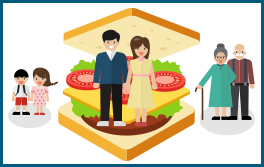
Caring for a parent while raising your own children and/or supporting an adult child makes you a bona fide member of the Sandwich Generation. Your role in this special club? Holding it all together.
Nearly half (47%) of adults ages 40-60 simultaneously care for an aging parent while also raising young children and/or supporting adult children. Here’s why:
- People are living longer. The number of people age 65 or older will double by 2030 to more than 70 million.
- The Boomerang Generation. About 38% of people ages 18-29 live with their parents.
Multigenerational households can be fun and full of love. That doesn’t mean the situation isn’t also stress-filled. If your parent doesn’t live with you, you likely spend quite a bit of time moving between two households. Long-distance caregivers have yet another unique set of stressors.
Bouncing between work, school events, doctor appointments and making sure everyone has what they need may leave you little time to catch your breath. Here are some ways to balance things out.
- Make time for yourself. It’s tough to step away from the people who need you most. Yet, doing just that will recharge you physically, mentally and emotionally. Whether it’s grabbing coffee with a friend, stealing a few hours for a workout or settling down with a good read, find your own space and enjoy it … guilt-free.
- Get everyone organized. From finances, to household chores, to extracurricular activities, to health-related services to just having fun, create a plan, write it down, share it and stick to it.
- Accept help. You may be a superwoman, but no one can handle all the responsibilities alone. If running the numbers isn’t your thing, hire a financial planner. If your parent needs additional care and/or companionship, search around for good care. Get help with your own tasks, too, stuff like cleaning and shopping. Enlist your children, or hire someone to help once a week.
- Manage your stress. First, figure out what triggers you. Then, identify ways to change your reaction. Short walks, deep breathing, meditating, time with friends and exercising are some of the more common - and free – stress relievers.
- Take care of your own health. If you aren’t in good health, you can’t take care of others. Eating nutritious foods, getting enough sleep, staying hydrated, exercising regularly and socializing with friends give you the energy you need to keep holding your sandwich together.
Related Articles

November 7, 2024
10000 Steps Good Enough
How many steps did you log today? It’s a popular question, and the gold standard answer is 10,000. Yet, depending on your health goals, you may need to pick up the pace.

June 1, 2019
5 Day Meal Prep
Who says eating healthy has to be difficult? One of our Registered Dietitians shows us how easy it can be to prep lunches for a busy week.

June 1, 2019
5 Foods With Health Benefits
Dark ChocolateBoost your mood and your memory (think antioxidants) by savoring dark chocolate. It may also help your heart health. Just 1 oz. is all it takes...

December 9, 2019
5 Free Indulgences
Are you ready for the hubbub of the holidays? The season’s festivities are always fun, but they can also wear you down. If your holiday spirit needs rechargi...

June 1, 2019
5 Minutes to a Happier You
Feeling stressed, angry or anxious? Head to the great outdoors. A new study has found that a five-minute walk can work wonders for your mood.The more natural...

July 27, 2022
5 Must Have Nutrients
Vitamins and minerals do a body good, but who has time to figure out which foods offer what benefits? This short list of five essential nutrients, opens new ...


